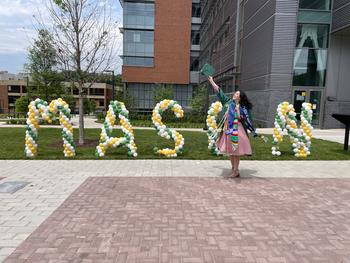
Brenda Henriquez, a brand-new computer science graduate as of May, says she always had George Mason University on her radar. Coming into a STEM area felt like a natural fit for her and she was excited to join the Break Through Tech DC at George Mason initiative as a peer leader.
“I’ve already seen and experienced the empowerment that comes from being a part of the Mason community. Joining Break Through Tech as a peer leader was my opportunity to be on the other side, and offer empowerment back to the students in STEM,” she says.
Henriquez founded the first ever ThinkBowl 2022, a female and non-binary focused collaborative pitch competition to assist students in bringing their tech ideas closer to reality. Through support from Break Through Tech and Girls Who Code, Henriquez helped students reach their goals and dive deeper into STEM areas.
ThinkBowl differs from a traditional hackathon, according to Henriquez, as the focus is more on the process of creating and editing a pitch rather than developing a functioning piece of software or hardware by the end of the event. ThinkBowl participants created projects such as mobile apps on recycling, proposed changes to the Mason360 user interface and functions, and a contemporary connections app – helpful for roommates – that splits utility bills equally.
“ThinkBowl 2022 was created to invest in creating a community to help and support female and non-binary students accelerate their growth within technology education and careers,” says Henriquez. “Our peer leaders still keep in touch.”
Henriquez also spent time with her fellow peer leaders hosting events on Masters/PhD workshops and forming Break Through Tech groups to participate in Patriot Hacks 2022. She was awarded the Outstanding Undergraduate Student Award at the Computer Science Awards ceremony held in May.
About Break Through Tech
Break Through Tech works at the intersection of academia and industry to propel more women and underrepresented communities into technology degrees and careers. Break Through Tech DC is the first cross-institutional collaboration, partnering with Mason and the University of Maryland.
